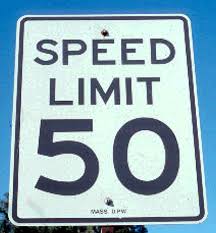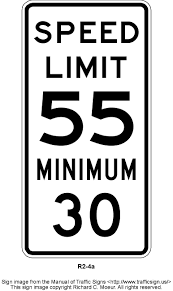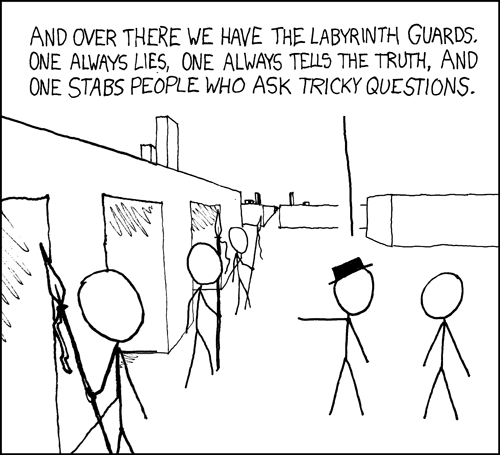
Friday, 10 December 2010
Monday, 26 July 2010
Saturday, 24 July 2010
Thursday, 17 June 2010
Smile

Bags have been placed over more than 200 cameras in the Washwood Heath and Sparkbrook districts of Birmingham. A total of 218 cameras - some of them hidden - were put up in various locations across the areas.Of those, 106 were Automatic Number Plate Recognition devices which were able to record car registrations as they moved around the areas.
In a statement in April, the Safer Birmingham Project (SBP) said it had received £3m from the Home Office to improve community safety and reduce crime in the Washwood Heath and Sparkbrook wards.
However, it has since emerged the cash had come through the Terrorism and Allied Matters (TAM) fund, which is administered by the Association of Chief Police Officers' (Acpo).
The SBP - a partnership of the police, the city council and other agencies - said on Thursday: "Although the counter-terrorism unit was responsible for identifying and securing central government funds and has overseen the technical aspects of the installation, the camera sites were chosen on the basis of general crime data - not just counter-terrorism intelligence."
Friday, 28 May 2010
Des Res, Ireland, last century.
Tuesday, 4 May 2010
Mod That Bod!


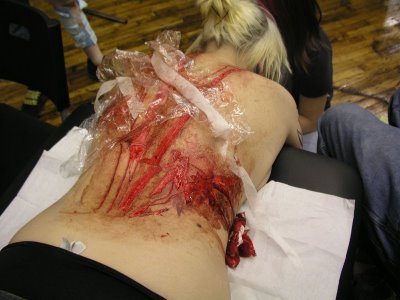 Take a back....
Take a back....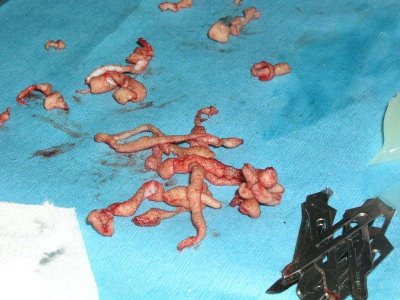 Carve these lumps out of it....
Carve these lumps out of it.... And you have a pretty pattern.
And you have a pretty pattern.





Mainly from http://thevelvetrocket.com/
Sunday, 2 May 2010
Sunday, 25 April 2010
Saturday, 24 April 2010
Anti Christ Update

The Foreign Office has apologised after a document suggested the Pope's visit to Britain should be marked by the launch of "Benedict" brand condoms.

The junior civil servant responsible was put on "other duties", it said. Entitled "The ideal visit would see..." the paper suggested the Pope be invited to open an abortion clinic and bless a gay marriage during September's visit.
Of course, this is ridiculous as, only last year, our favorite never-really-a-nazi pope pointed out that they are completely useless pieces of rubber and that Aids was
"a tragedy that cannot be overcome by money alone, that cannot be overcome through the distribution of condoms, which even aggravates the problems.
The traditional teaching of the church has proven to be the only failsafe way to prevent the spread of HIV/Aids."
Tuesday, 20 April 2010
Did the Earth move for you?

Promiscuous women are responsible for earthquakes, a senior Iranian cleric has said.
Hojatoleslam Kazem Sedighi told worshippers in Tehran last Friday that they had to stick to strict codes of modesty to protect themselves.
"Many women who do not dress modestly lead young men astray and spread adultery in society which increases earthquakes," he said.
 "What can we do to avoid being buried under the rubble? There is no other solution but to take refuge in religion and to adapt our lives to Islam's moral codes," he said.
"What can we do to avoid being buried under the rubble? There is no other solution but to take refuge in religion and to adapt our lives to Islam's moral codes," he said.
Saturday, 20 February 2010
Ur
littered the way.
In the wide streets
where the crowds once gathered and cheered,
the corpses lay scattered.
In the fields where the dancers once danced
the dead were heaped up in piles.......
This is my house:
where food is not eaten,
where drink is not drunk,
where seats are not sat in,
where beds are not made,
where jars lie empty,
and cups are overturned,
where harps no longer vibrate
and tunes no longer sing.
This is my house:
without a husband,
without a child,
without even
me.
Anon
c.2100 BC
Tuesday, 16 February 2010
Saturday, 13 February 2010
Saturday, 16 January 2010
Fancy a Byte?

- Byte [ 8 bits]
- 0.1 bytes: a binary decision;
- 1 byte: a single character;
- 10 bytes: a single word;
- 100 bytes: a telegram or a punched card;
- Kilobyte [ 1,000 bytes OR 103 bytes]
- 1 Kilobyte: A very short story;
- 2 Kilobytes: A typewritten page;
- 10 Kilobytes: An encyclopaedic page OR a deck of punched cards;
- 10 Kilobytes: static web page;
- 50 Kilobytes: A compressed document image page;
- 100 Kilobytes: A low-resolution photograph;
- 200 Kilobytes: A box of punched cards;
- 500 Kilobytes: A very heavy box of punched cards;
- Megabyte [ 1,000,000 bytes OR 106 bytes]
- 1 Megabyte: A small novel OR a 3.5 inch floppy disk;
- 2 Megabytes: A high resolution photograph;
- 5 Megabytes: The complete works of Shakespeare OR 30 seconds of TV-quality video;
- 10 Megabytes: A minute of high-fidelity sound OR a digital chest X-ray;
- 20 Megabytes: A box of floppy disks;
- 50 Megabytes: A digital mammogram;
- 100 Megabytes: 1 meter of shelved books OR a two-volume encyclopaedic book;
- 200 Megabytes: A reel of 9-track tape OR an IBM 3480 cartridge tape;
- 500 Megabytes: A CD-ROM OR the hard disk of a PC;
- Gigabyte [ 1,000,000,000 bytes OR 109 bytes]
- 1 Gigabyte: a pickup truck filled with paper OR a symphony in high-fidelity sound OR a movie at TV quality;
- 2 Gigabytes: 20 meters of shelved books OR a stack of 9-track tapes;
- 5 Gigabytes: 8mm Exabyte tape;
- 20 Gigabytes: A good collection of the works of Beethoven OR 5 Exabyte tapes OR a VHS tape used for digital data;
- 50 Gigabytes: A floor of books OR hundreds of 9-track tapes;
- 100 Gigabytes: A floor of academic journals OR a large ID-1 digital tape;
- 200 Gigabytes: 50 Exabyte tapes;
- 500 Gigabytes: The biggest FTP site.
- Terabyte [ 1,000,000,000,000 bytes OR 1012 bytes]
- 1 Terabyte: An automated tape robot OR all the X-ray films in a large technological hospital OR 50000 trees made into paper and printed OR daily rate of EOS data (1998);
- 2 Terabytes: An academic research library OR a cabinet full of Exabyte tapes;
- 10 Terabytes: The printed collection of the US Library of Congress;
- 50 Terabytes: The contents of a large Mass Storage System;
- 400 Terabytes: National Climactic Data Center (NOAA) database;
- Petabyte [ 1,000,000,000,000,000 bytes OR 1015 bytes]
- 1 Petabyte: 3 years of EOS data (2001);
- 2 Petabytes: All US academic research libraries;
- 8 Petabytes: All information available on the Web;
- 20 Petabytes: Production of hard-disk drives in 1995;
- 200 Petabytes: All printed material OR production of digital magnetic tape in 1995;
- Exabyte [ 1,000,000,000,000,000,000 bytes OR 1018 bytes]
- 2 Exabytes: Total volume of information generated worldwide annually.
- 5 Exabytes: All words ever spoken by human beings.
- Zettabyte [ 1,000,000,000,000,000,000,000 bytes OR 1021 bytes]
- Yottabyte [ 1,000,000,000,000,000,000,000,000 bytes OR 1024 bytes]

Saturday, 9 January 2010
SPEEDING
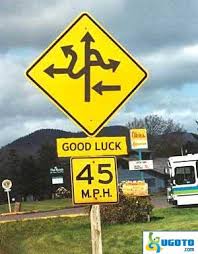
A police officer who was caught driving at 98mph in a 50mph zone claimed the speed limit was not enforceable because the signs were not lit.
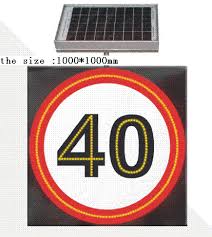


A new court ruling means that someone at the front of a group of vehicles is now responsible for the highest speed of any member of the group and will get points/ban accordingly.


Traffic engineers may rely on the 85th percentile rule to establish speed limits. The speed limit should be set to the speed that separates the bottom 85% of vehicle speeds from the top 15%.
The theory is that traffic laws that reflect the behavior of the majority of motorists may have better compliance than laws that arbitrarily criminalise the majority of motorists and encourage violations. The latter kinds of laws lack public support and often fail to bring about desirable changes in driving behaviour. However, a review of available speed studies demonstrates that the posted speed limit is almost always set well below the 85th-percentile speed by as much as 8 to 12 mph.
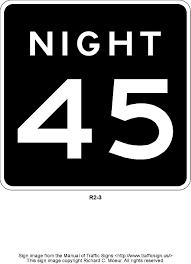
Motorists in some regions of Britain are twelve times more likely to be given speeding fines and points on their licence than in other areas, according to new research which highlights a "postcode lottery" of motoring prosecutions.

This Man is A Twat
From the Beeb on14th December:
Half of the UK's local authorities only have enough road salt for six days of continuous freezing, the AA has said. The motoring organisation said it understood councils had 250,000 tonnes less road salt in stock than they would have had a decade ago.
It said last winter's heavy snow meant stocks had dwindled and some councils had to "borrow" from others. The organisation added local authorities' reliance on "just in time" deliveries left too many of them vulnerable to a lengthy big freeze or major snowfall.
"We accept that not every road can be treated, but we must do a lot more to keep the wheels of the economy turning in winter emergencies and 'routine' winter weather. That means getting enough salt stocks in place now."
The AA said it was surprised councils had agreed to cut the amount of salt they were using, as it was already being mixed with grit to try and extend its reach.
"The roads we come to expect to be safe may no longer be safe, and I think people need to know which roads are and which roads aren't going to be treated any more so that we can at least have an indication where our journey are going to be hazardous and maybe delayed."
Our fat twat had obviously been at the whisky/port/real ale when he jibbered this reply:
"The major roads will be gritted, the major communications between the country, and within local authorities and regions... at the moment we have done everything we can do, and we're in partnership with the government, and we are dealing with this problem," he said.

Unfortunately, wankers like Sparksie are unsackable.
SHOOT THE FUCKERS, MAKE BRITAIN GREAT AGAIN.
Monday, 4 January 2010
Saturday, 2 January 2010
MMMMMMMMMM.... Burger.....
Salmonella. Money. Burgers. Kids. E Coli. Money. Waste meat. Burgers. Money...EUREKA!!
.JPG)
"Well, it made me a fat multi millionaire, so how bad can it be?"
Beef Products Inc. founder and Repug contributor, Eldon Roth, receives a commemorative burger for his tireless and essential work to make the US the biggest nation in the world.
Eight years ago, federal officials were struggling to remove potentially deadly E. coli from hamburgers when Mr. 'Big Daddy' Roth came up with a novel idea: injecting beef with ammonia. Federal officials agreed to the company’s request that the ammonia be classified as a “processing agent” and not an ingredient that would be listed on labels. A USDA department microbiologist, Gerald Zirnstein, called the processed beef "pink slime" in a 2002 e-mail message to colleagues and said, “I do not consider the stuff to be ground beef, and I consider allowing it in ground beef to be a form of fraudulent labeling.”
As suppliers of national restaurant chains and government-financed programs were buying Beef Product meat to use in ground beef, complaints about its pungent odor began to emerge. In early 2003, officials in Georgia returned nearly 7,000 pounds to Beef Products after cooks who were making meatloaf for state prisoners detected a “very strong odor of ammonia” in 60-pound blocks of the trimmings, state records show.
Untreated beef naturally contains ammonia and is typically about 6 on the pH scale, near that of rain water and milk. The Beef Products’ study that won U.S.D.A. approval used an ammonia treatment that raised the pH of the meat to as high as 10, an alkalinity well beyond the range of most foods. The company’s 2003 study cited the “potential issues surrounding the palatability of a pH-9.5 product.”
Soon after getting initial approval from the agriculture department, the company devised a plan to make a less alkaline version of the beef, internal company documents show. Beef Products acknowledged in an e-mail exchange that it was making a lower pH version, but did not specify the level or when it began selling it.
In 2008, after the school lunch program temporarily suspended a Beef Products plant for salmonella contamination, the company wrote in a letter that its effort to combat ammonia “aroma” might have reduced the alkalinity below the initial target levels. Samples of the treated beef obtained by The Times this month showed a pH as low as 7.75, according to an analysis by two laboratories. Dr. Michael P. Doyle, a food industry consultant and director of the Center for Food Safety at the University of Georgia, said one point on the exponential pH scale was a considerable difference, and “could have a significant effect on the antimicrobial effectiveness of the ammonia.”
From Big Daddy's corporate website (minor edits):
"BPI's process begins with USDA inspected beef trimmings from the fabrication lines of approved establishments that meet BPI's raw material specifications.
 The selected trimmings are transported by conveyor to a material accumulator, which feeds into a de-sinewing device. Here, virtually all non-functional protein is removed, including cartilage, sinew and connective tissue that could not be removed in the hand trimming process.
The selected trimmings are transported by conveyor to a material accumulator, which feeds into a de-sinewing device. Here, virtually all non-functional protein is removed, including cartilage, sinew and connective tissue that could not be removed in the hand trimming process.
The trim is then tempered to near post-mortem temperature to facilitate the separation of lean from fat by centrifugal force. By managing raw materials and attention to processing applications, we are able to closely match finished product fat and moisture content to customer specifications, typically achieving a 94% lean or better finished product.
At this point, the lean trim may be treated with a pH enhancement process that forms ammonium hydroxide in the finished product. In two independent process validation studies conducted by Iowa State University and National Food Laboratory, Inc., the BPI process1 eliminated all E.coliO157:H7 in the inoculated product, as well as producing significant reductions of Salmonella and Listeria monocytogenes. The pH enhanced product is marketed as BPI® Boneless Lean Beef Trimmings. BPI®Boneless Lean Beef Trimmings are approved for unrestricted use in ground beef and hamburger with no labeling restrictions other than beef."
The U.S. federal school lunch program used an estimated 5.5 million pounds of the processed beef last year.

UPDATE:
Stephanie Smith, a children’s dance instructor, thought she had a stomach virus.
Ms. Smith, 22, was found to have a severe form of food-borne illness caused by E. coli, which Minnesota officials traced to the hamburger that her mother had grilled for their Sunday dinner.
PTSD
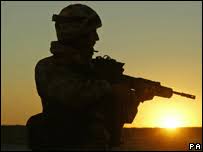
A soldier writes.....
Since Iraq, I might go several days without sleep. When I do sleep, I often wake up after a bad dream and all I want to do is put on my gear, grab my weapon and hurt someone. On nights like that I can never fall back asleep.
I was in Iraq for almost 40 months straight, so long that all of my neighbors at home moved away.
I joined the Marines in 1977 and served in the infantry until I got out in 1981. I went to work for a major transportation company, eventually rising to a management position, but as I saw the war in Iraq dragging on, I decided in 2005 to re-enlist. I was too old at 46 to get back into the Marine Corps, but with a waiver I was able to join the Army National Guard. I volunteered for the next unit deploying to Iraq, and reached the combat zone in late 2005. I truly enjoyed being in Iraq and doing an important and dangerous job.
I volunteered to stay in Iraq for four consecutive tours. I stayed because I felt that I was doing something worthwhile, regardless of the politics of the war. I stayed in Iraq because I knew that I was good at my job. I enjoy the infantry, the core fighting unit of any armed force. Not everyone can handle the conditions we suffer and the environment we operate in. And I stayed in Iraq because I adjusted so well to the environment there that I did not want to come home.
This is part of the sickness of PTSD. We become so proficient at operating in combat that we forget how to function effectively in a normal environment. Therapists and readjustment counselors call some of these symptoms “survival skills,” behaviors that keep us safe and alive in a combat environment. Being paranoid and quick to react to movement or sound, and the readiness to use violence are all good things in war. It isn’t easy to come home and turn that off, because when we try to do it we don’t feel safe.
I don’t feel comfortable at home anymore. My threat tolerance and response to perceived threats is so finely tuned that I felt safer in Iraq. Here, every stranger looks like a possible threat. If I am driving near my house and a car pulls in behind me, I will take several extra turns to make sure that I am not being followed. When I am home I feel like I am being watched. At night I leave the lights off in my house and the blinds drawn so no one can see inside. My dog thinks I am an idiot because I am always running into him in the dark.
At least in Iraq I had an armored vehicle and body armor, and I carried and operated several weapon systems. Most importantly, we had skilled soldiers watching each others’ backs. At home, I have none of that. I have no protection and I do not have any authority to tell people to get out of my way or to stop moving. If I had a choice, I would still be in Iraq or in Afghanistan.
People don’t realize how PTSD affects us. They don’t understand why we are hyper-alert and always looking for threats. They don’t understand why we are always angry and want to be in a controlled environment. I have had family members tell me that I should just relax and get myself under control. They think it is just a matter of self-control, and that it should be easy to fix. It isn’t. Do they think we want to be like this? Don’t they understand that if it was that easy we would not need to be in treatment? Then they wonder why we don’t want to talk about it.
My family is upset with me, because I do not stay in very good contact. But I don’t like them asking questions. I guess I should feel lucky that I have a family who cares about me. None of the feelings I have right now are really rational anyway. One of the biggest frustrations of having PTSD is that you feel differently than your logic tells you to feel.
I had a traumatic brain injury from a roadside bomb in Iraq, so my memory is not good at all now. I get lost driving around my hometown. I forget what room I am in at a hotel and I forget appointments and conversations with people. I cannot seem to concentrate and I can no longer read like I used to. I have to re-read the same page over and over, then the next day I have to read it again. This adds to the frustration and anger that I feel every day.
I am now at the Pathway Home, a residential recovery program that is helping me with my PTSD. I like Pathway’s quiet, calm environment. I feel safe here and I am getting some very good group and individual therapy. I think I have to pay attention to saving money for retirement. How much money I save will determine how long I should live, because after I retire I don’t want to live longer than my savings last.
It is hard to picture myself in the future. I cannot see far enough ahead to plan. I have no interest in any long-term goals. For 40 months in Iraq all I thought about was the mission we were on or our next one. Now I am home and I don’t know what I want to do or why I have no interest in the future. I can’t explain why I made it home in one piece or what my purpose in life is now. I feel like I accomplished a lot in Iraq, and I don’t understand what is left in life for me to achieve. Part of me feels like I should have died in Iraq.
I also want you to know that we did a lot of good over there. We performed professionally and we completed our missions well. When I first got to Iraq in late 2005, the country was a mess. The insurgency was gaining momentum and attacks on U.S. troops continued to increase until they peaked in 2007. By the time I can home in April of 2009 many schools and markets had re-opened. Displaced people were moving back into their homes. The government was holding elections and the Iraqi army and police were in much better shape to provide security.
We got the country back on its feet after we bombed it back into the Stone Age. We did a lot of good, and our efforts were not all wasted.
Just understand that none of us came back the same as when we left.












